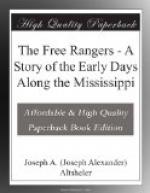They would have repeated the offer, but they saw that he was not to be moved and they talked of other things. The rest was, in truth, welcome to all, as the labors and dangers of the night had been a severe strain upon their nerves and strength, and they luxuriated before the fire while the peaceful day passed. Henry noticed that the water was still rising, and that the mass of floating debris was also increasing.
“It’s been a tremendous rain,” he said, “and it’s extended far up. It must have been raining on all the great rivers that run into the Mississippi on either side, away off there in the north. It’s going to be a mighty big flood, and this hill itself will go under.”
“You’re right,” said Shif’less Sol. “It’s a mighty big river any time but is shorely gittin’ to be like a sea now.”
They walked back to the little party by the fire. The day had considerable coolness in it after the rain, and the warmth was still welcome. Little was left for them to do and they still luxuriated in rest. Like all woodsmen in those times who were compelled to endure long and most strenuous periods of toil and danger, they knew how to do nothing when the time came, and let Nature recuperate the tired faculties.
The brilliant sun shone on the river, the muddy waters were gilded with gold. The east turned to rose, then to red, and after that came the shadows. The mellow voice of the priest was lifted in a solemn Latin hymn. His song carried far over the darkening waters, and Paul, under its influence, felt more deeply than ever the immense majesty of the scene. Red light from the sunken sun still lingered over the longest of rivers, but the shadows now covered all the eastern shore. Through the increasing night the firelight on the little island twinkled like a beacon, but for the time being, they were careless who saw it.
The hymn died away in a last long echo, the red light was wholly gone, darkness was over everything, and they prepared for a long night of sleep. The next morning they started together, the big boat and the little canoe. Every one of the five offered to paddle the canoe for Father Montigny as far as they were going together, but he smilingly declined.
“No,” he said, “my good canoe and I have been closely associated too long to be separated now, nor must I be spoiled. I see that you have put fresh stores in the canoe, and I accept them. You have good hearts, as I knew when I first saw you.”
The five would not put up their sail while they were in company, and “The Galleon” and the canoe drifted together until they reached the mouth of the river up which the peaceful Indian village lay. There Father Montigny gave them his blessing and bade them farewell. They held their own boat in the current while they watched him paddle with strong arms up the tributary stream. He stopped at the first curve, lifted his paddle in a last salute, which they returned with their own lifted oars, and then he passed out of sight.




